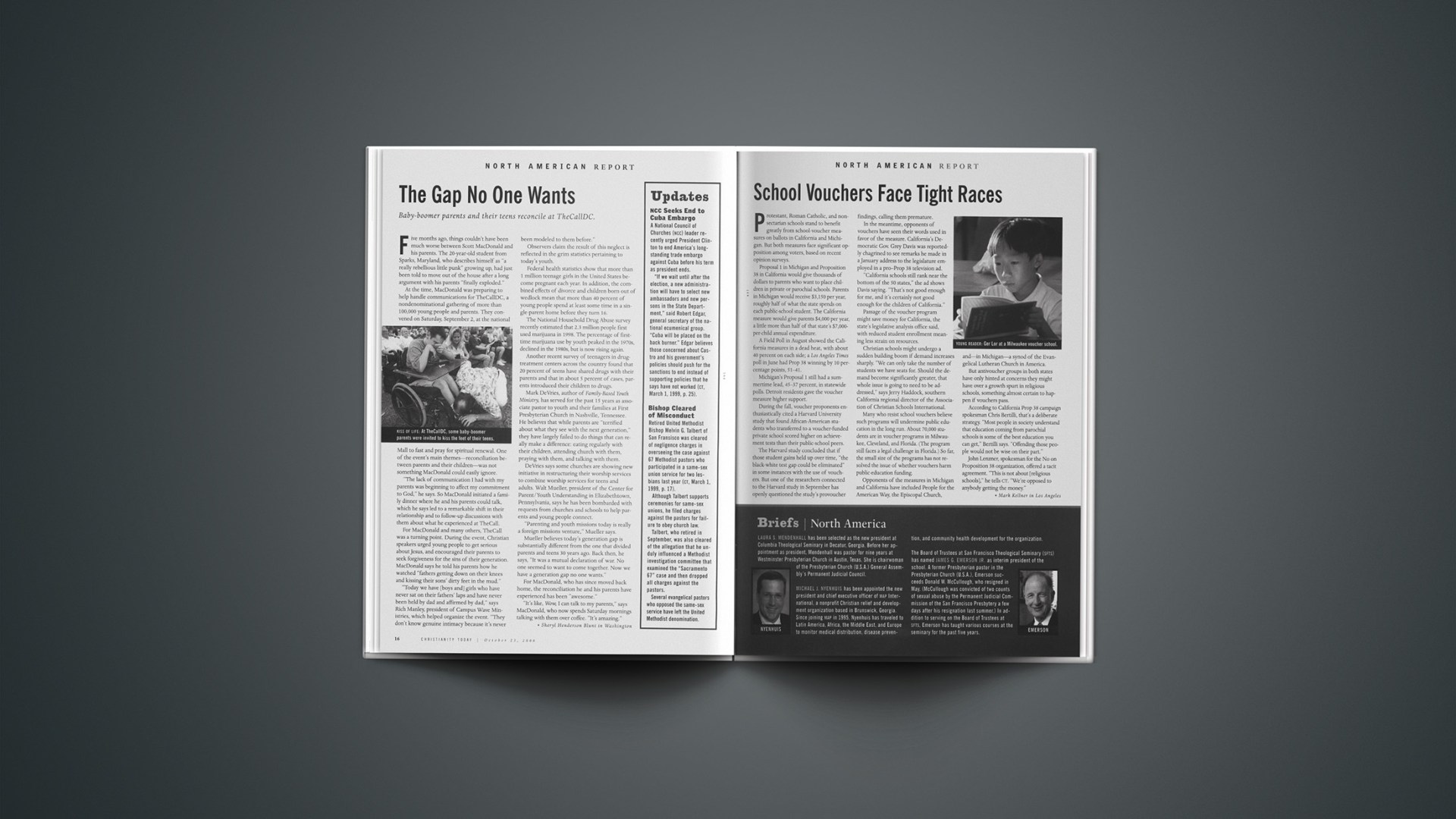Protestant, Roman Catholic, and nonsectarian schools stand to benefit greatly from school-voucher measures on ballots in California and Michigan. But both measures face significant opposition among voters, based on recent opinion surveys. Proposal 1 in Michigan and Proposition 38 in California would give thousands of dollars to parents who want to place children in private or parochial schools. Parents in Michigan would get $3,150 per year, roughly half of what the state spends on each public-school student. The California measure would give parents $4,000 per year, a little more than half of that state’s $7,000-per-child annual expenditure. A Field Poll in August showed the California measures in a dead heat, with around 40 percent on each side; a Los Angeles Times poll in June had Prop 38 winning by 10 percentage points, 51 to 41. Michigan’s Proposal 1 still had a summertime lead, 45 to 37 percent, in statewide polls. Detroit residents gave the voucher measure higher support. During the fall, voucher proponents enthusiastically cited a Harvard University study that found African-American students who transferred to a voucher-funded private school scored higher on achievement tests than their public-school peers. The Harvard study concluded that if those student gains held up over time, “the black-white test gap could be eliminated” in some instances with the use of vouchers. But one of the researchers connected to the Harvard study in September has openly questioned the study’s provoucher findings, calling them premature.In the meantime, opponents of vouchers have seen their words used in favor of the measure. California’s Democrat Gov. Grey Davis was reportedly chagrined to see remarks he made in a January address to the legislature employed in a pro-Prop 38 television ad.”California schools still rank near the bottom of the 50 states,” the ad shows Davis saying. “That’s not good enough for me, and it’s certainly not good enough for the children of California.”Passage of the voucher program might save money for California, the state’s legislative analysis office said, with reduced student enrollment meaning less strain on resources.Christian schools might undergo a sudden building boom if demand increases sharply. “We can only take the number of students we have seats for. Should the demand become significantly greater, that whole issue is going to need to be addressed,” says Jerry Haddock, southern California regional director of the Association of Christian Schools International.Many who resist school vouchers believe such programs will undermine public education in the long run. About 70,000 students are in voucher programs in Milwaukee, Cleveland, and Florida, where the program still faces a legal challenge. So far, the small size of the programs has not resolved the issue of whether vouchers harm public-education funding. Opponents of the measures in Michigan and California have included People for the American Way, the Episcopal Church, and—in Michigan—a synod of the Evangelical Lutheran Church in America. But antivoucher groups in both states have only hinted at concerns they might have over a growth spurt in religious schools, something almost certain to happen if vouchers pass.According to California Prop 38 campaign spokesman Chris Bertilli, that’s a deliberate strategy. “Most people in society understand that education coming from parochial schools is some of the best education you can get,” Bertilli says. “Offending those people would not be wise on their part.”John Lenzner, spokesman for No on Proposition 38, offered a tacit agreement. “This is not about [religious schools],” he tells CT. “We’re opposed to anybody getting the money.”
Related Elsewhere
Other media coverage of school vouchers includes:School Wars—The Washington Post (Sept. 25, 2000) Home-schoolers Shun Money from Prop. 38— Daily News (Sept. 25, 2000) School Voucher Proposal Dwarfs Existing Programs—Los Angeles Times (Sept. 24, 2000)Previous Christianity Today stories on vouchers include:Florida School Voucher Plan Struck Down by State Judge | Church-state issues not addressed in ruling. (March 24, 2000) Judge Freezes Voucher Enrollments | (Oct. 4, 1999) Religious Schools Make the Grade | Give Wisconsin an A for saying no to secularist nonsense. (Aug. 10, 1999) Voucher Victory | School-choice advocates win in Wisconsin, but can the movement gain momentum? (Sept. 7, 1998) Judge Stalls Voucher Expansion | (March 3, 1997)
Copyright © 2000 Christianity Today. Click for reprint information.










